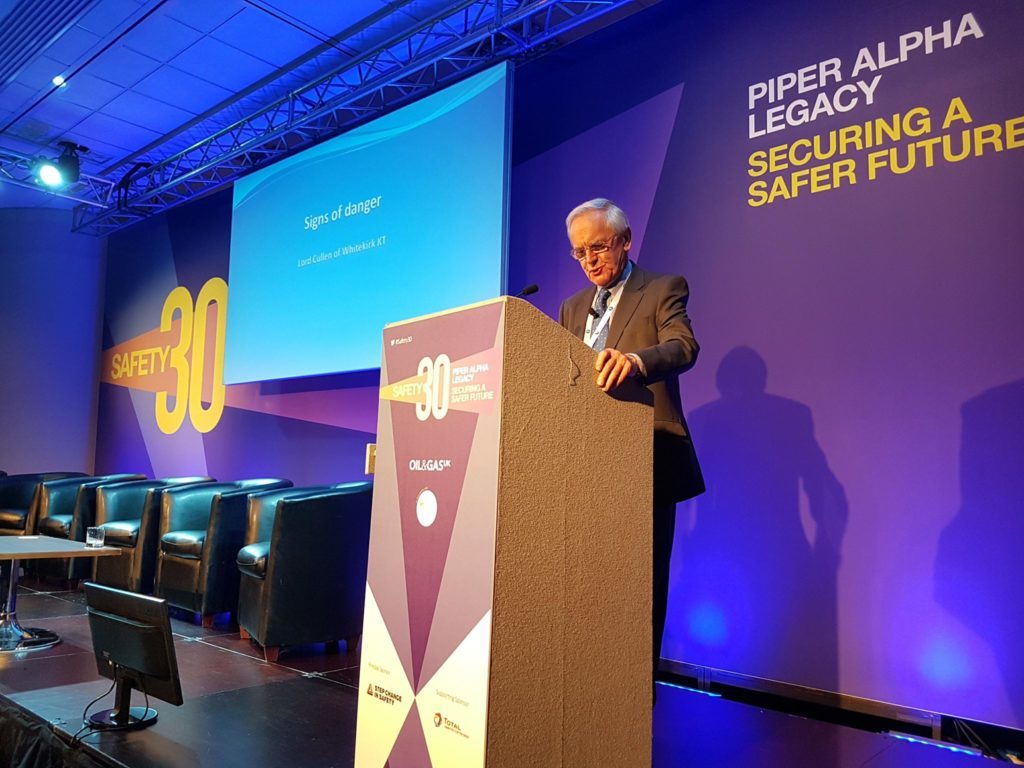
The man responsible for the exhaustive public inquiry into the Piper Alpha disaster has condemned management for ignoring “warning signs” the tragedy could take place.
Lord Cullen delivered the keynote speech on day one of the Safety 30 conference at the AECC, organised by industry body Oil and Gas UK.
He also used examples since the accident such as the Columbia space shuttle explosion and the Deepwater Horizon oil spill to drive home the need for a thorough reporting and safety culture, adding that some investigations had been “limited in scope or superficial”.
He said that management had “not accepted” a number of reports preceding the disaster outlining the potential for it to take place.
167 people lost their lives in the North Sea accident in 1988 when an explosion ripped through the Piper Alpha platform.
In his address, Lord Cullen said: “Sometimes the warning signs are in reports about danger and I return to the Piper Alpha disaster.
“Initial explosion and the fire that followed took place in an hour and a half by the rupture of a number of gas risers that had been rooted through the platform. This led to the loss of normal means of evacuation, the destruction of the platform and huge loss of life.
“The management could have been in no doubt as to the grave consequences to the platform and its personnel in the event of a prolonged high-pressure gas fire.”
Despite a series of reports in the years immediately preceding the disaster outlining the dangers to structural integrity of the platform, and how such a fire would be “almost impossible to fight”, he said management showed a “dangerously superficial approach” to safety.
He added: “Management had not accepted that this would happen. They had rejected the installation of subsea isolation valves and fireproofing of structural members as being impractical. They had relied on emergency shutdown valves and limited deluge system, both of which were wrecked by the initial explosion.
“They had not carried out a systematic identification and assessment of potential hazards or put in place adequate measures for controlling them but had merely relied on a qualitative opinion. It showed, in my view, a dangerously superficial approach.”
Lord Cullen also warned against inadequate safety inspections for the larger offshore industry and further afield.
He addressed failings in the safety processes which led to the 2003 Columbia space shuttle explosion and the Gulf of Mexico oil spill in 2010.
He said the former case was an instance where a safety concern – a piece of insulation foam which had broke off and damaged the shuttle – was treated as “normal”, reducing the danger signs.
The latter case was an instance where a cement job to seal the well had been assumed to be successful.
He warned against three factors leading to the incidents; poor safety awareness, failure to give priority to safety and a failure to instil in others the responsibility for identifying and resolving safety issues.
Lord Cullen said: “People who are responsible for safely may be tempted to prefer a harmless explanation for what are, in fact, signs of danger.
“Lest you may think that in any of these cases they were simply no more than human error, I must say that the accidents, practices and values of the workforce are often shaped by the tone set by management. That’s another chapter in the book of lessons. There is much to be learned from the experiences of others.
“The commission which investigated the accident at Three Mile Island coined the phrase ‘an absorbing concern with safety’. So should it be for us also.”
Recommended for you

